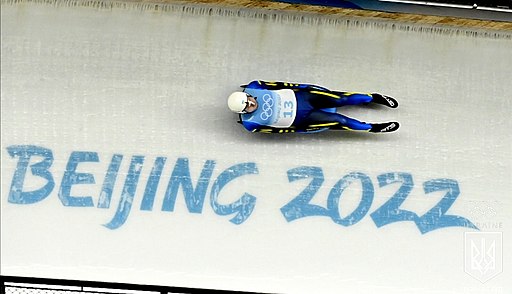Controversy leaves its mark on 2022 Winter Olympics

Luge athlete Andriy Mandziy of Ukraine competes at the 2022 Winter Olympics on Feb. 6, 2022.
After four years, the Winter Olympics returned this month, and the 2022 Beijing Olympic Games certainly have been memorable ones. This year’s Games not only had to face the lasting effects of the COVID-19 pandemic but also had to face their fair share of controversies.
The Beijing Games started on Feb. 4, but China was preparing for them long before this month began. The Chinese government put in place several precautions and additional policies in an attempt to enforce its zero percent Covid policy. According to CNN, “to those new to China’s ‘zero-Covid’ approach, the meticulous control is both confusingly convoluted and alarmingly restrictive. Often, Covid prevention makes simple tasks unnecessarily difficult.”
Some Olympics watchers believe the controversy takes away from the Games and athletes who are competing, and may affect how the athletes perform.
“As a competitor, I think the hardest thing would be the lack of spectators, especially not having family there,” said coach Marty Owens, director of women’s triathlon, cross country and track and field here at Guilford. “I have seen a lot of the reports on news channels regarding the measures to keep the Olympic Village and venues separate from the rest of the country.” While those measures may seem extreme, “given the pandemic you would have to expect that,” Owens added.
Since COVID-19 is still a wide-reaching issue affecting everyone in the world, China’s very cautious approach makes sense with athletes traveling there from across the globe. However, even with all of those precautions, coronavirus cases emerged within the games. On Feb. 4, after the opening of the Games, CNN reported that “more than 300 coronavirus cases — about a third of them linked to athletes and team officials” already had been detected among Olympics participants who had recently arrived in Beijing.
Despite these controversies and some American athletes being unable to compete because of the virus, at the close of the Olympics, according to olympics.com, U.S. Olympians had won eight gold medals, 10 silver medals and seven bronze medals for a total of 25 at the close of the Games on Feb. 20. According to olympics.com, a website maintained under the umbrella of the International Olympic Committee, that puts the U.S. at fifth place in the total medal count, with Norway in the top spot with 37 medals.
The first USA medal was won by snowboarder Julia Marino on Feb. 5. Marino won a silver medal in women’s snowboarding slopestyle with an impressive two runs, the first with a time of 30.61 and a second run of 87.68, which won her the medal. On Feb. 6, skier Jaelin Kauf won the silver medal in the women’s moguls event.
On Feb. 7, the USA figure skating pair team Alexa Knierim and Brandon Frazier scored 128.97 points with their free skate. Ice dance team Madison Chock and Evan Bates performed their “Daft Punk” program and placed first in the free dance.
In another prime-time figure skating event, Karen Chen scored 131.52 points, resulting in a team silver medal in the women’s figure skating team event. However, as part of the most-publicized controversy of the Beijing Olympics, the color of the figure skating team’s medal could change if positive drug test results for 15-year-old Russian skater Kamila Valieva prove conclusive. Her flawless performance in the women’s team figure skating event gave the Russian Olympic Committee’s women’s team the win and a gold medal on Feb.7.
Another U.S. silver medal on Feb. 7 was just four hundredths of a second away from gold, according to the New York Times. Won by Ryan Cochran-Siegle in Alpine skiing’s men’s super-G, the silver medal was the first U.S. medal in Alpine Skiing at the Beijing Games.
Team USA’s first bronze medal was won by Jessie Diggins in the cross-country skiing event. On Feb. 9, Colby Stevenson won the silver medal in freestyle skiing. In the women’s snowboardcross on Feb. 9, the U.S. scored its first gold medal of the games with a win by Lindsey Jacobellis.
On the same day, Chloe Kim won the second gold medal of the Games for the U.S in snowboarding’s women’s halfpipe, making her the first multi-title winner of the women’s halfpipe Olympic division in history. Lastly on Feb. 9, the U.S got its third gold medal when Nathan Chen prevailed to meet his longtime goal of becoming an Olympic champion in men’s single figure skating.
In freestyle skiing’s mixed team aerials, a new event for the Winter Olympics, Ashley Caldwell, Chris Lillis, and Justin Schoenefeld won gold on Feb. 10. In the U.S. mixed team snowboardcross finals, Lindsey Jacobellis and Nick Baumgartner also won a gold medal. Speedskater Erin Jackson won a gold medal and made history on Feb. 13, as the first black woman to medal in her sport in the speedskating women’s 500-meters event.
The ice dance team of Madison Hubbell and Zach Donohue won the bronze medal for the U.S. on Feb. 13. Kaillie Humphries and Elana Meyers Taylor won gold and silver medals retrospectively in the bobsledding event in the women’s monobob, also on Feb. 13. In freestyle skiing’s women’s ariel, U.S. competitor Megan Nick won the bronze medal on Feb. 14.
The U.S. speedskating team of Ethan Cepuran, Casey Dawson, Emery Lehman and Joey Mantia earned the bronze medal in speedskating’s men’s team pursuit on Feb. 15. Also on Feb. 15, Alexander Hall won a gold medal in freestyle skiing in the men’s freeski slopestyle and Nicholas Goepper won a silver medal in the freeski slopestyle.
On Feb. 17, the U.S. women’s hockey team lost to Canada’s team to earn a silver medal in the women’s hockey division. Brittany Bowe won a bronze medal in speedskating’s women’s 1000 meters on that date. Skier Jessie Diggins, Sylvia Hoffman and Elana Meyers Taylor in two-woman bobsled, and freestyle skier Alex Ferreira all medaled for Team USA in the final two days of the Games, Feb. 19 and 20.
The United States performed quite well in this year’s Olympics, despite the controversy and difficulties. And given the usual rise in interest in American athletes and lesser-known winter sports that typically surrounds the Winter Olympics, Guilford coach Owens expressed surprise at not seeing “much mention of the Olympics or inclusion of an Olympic theme in some college events.”
However, a low profile for the Beijing Olympics at Guilford does match up with low TV ratings for the Games. According to NPR, NBC’s coverage of the Winter Olympics had the smallest TV audience in the network’s history of broadcasting the Olympic Games, even while the 2022 Beijing Games were the most streamed Winter Olympics ever.
As quoted by the Los Angeles Times, Sarah Hirshland, chief executive of the U.S. Olympic and Paralympic Committee, chose to focus on the positive when reflecting on the ups and downs of the Games. “‘If the outcomes were predictable,’ she said, “‘this wouldn’t be fun for any of us.’”










